KAI
-
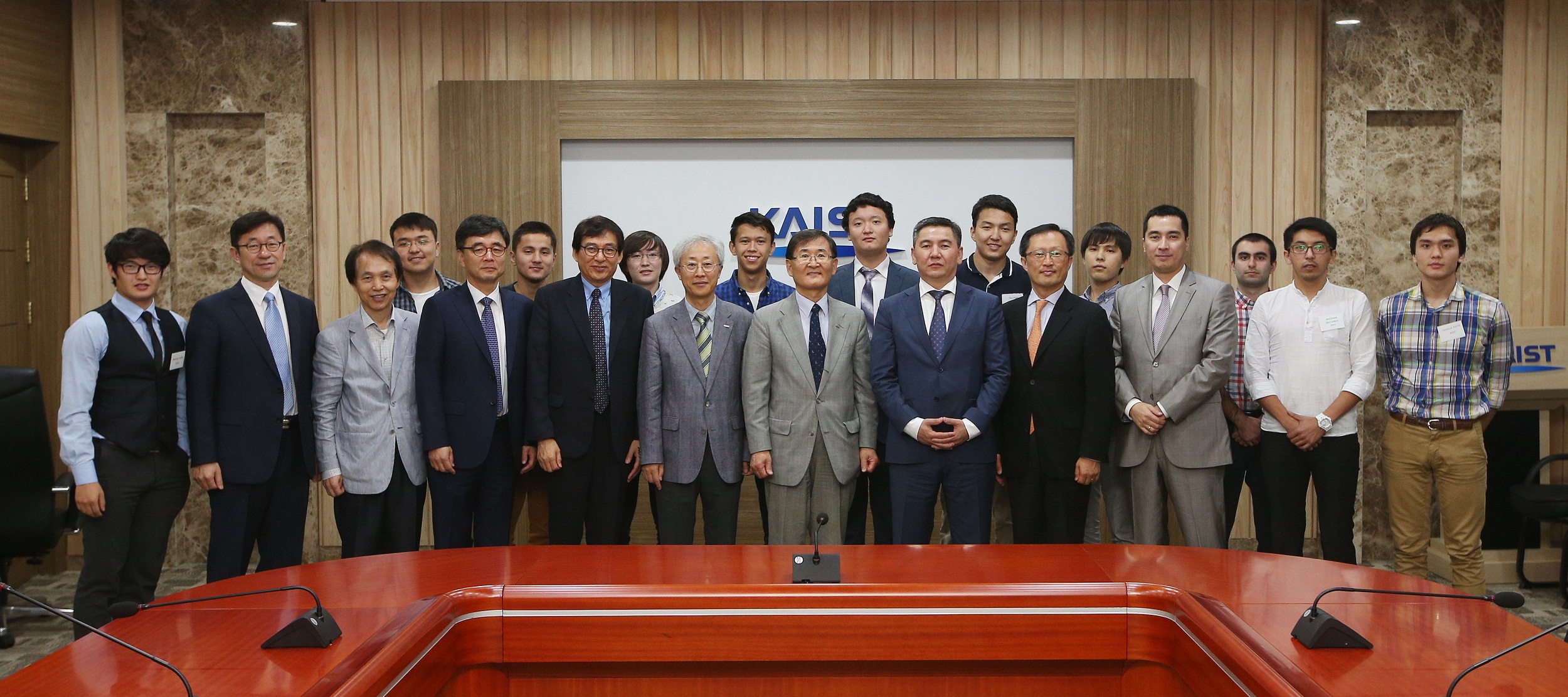 The Minister of Education of Kazakhstan Visits KAIST
The Minister of Education of the Republic of Kazakhstan, Aslan Sarinzhipov, and his delegation visited KAIST on June 30, 2015.
Dr. Young-Suk Ji, the Chairman of Elsevier, an academic publishing company that publishes medical and scientific literature, arranged the visit.
The Kazakh delegation showed great interest in KAIST’s educational system and research programs during their meeting with President Steve Kang of KAIST. In particular, the delegation was most impressed by the startups and entrepreneurship programs established at the KAIST Pangyo Innovation Center.
President Kang said, “I hope the Minister’s visit will help inspire more Kazakh students to come to Korea and study at KAIST.”
Kazakhstan, located in the northern part of Central Asia, gained its independence in 1991 after the collapse of the Soviet Union. Currently, there are 22 Kazakh students studying at KAIST.
2015.07.03 View 5678
The Minister of Education of Kazakhstan Visits KAIST
The Minister of Education of the Republic of Kazakhstan, Aslan Sarinzhipov, and his delegation visited KAIST on June 30, 2015.
Dr. Young-Suk Ji, the Chairman of Elsevier, an academic publishing company that publishes medical and scientific literature, arranged the visit.
The Kazakh delegation showed great interest in KAIST’s educational system and research programs during their meeting with President Steve Kang of KAIST. In particular, the delegation was most impressed by the startups and entrepreneurship programs established at the KAIST Pangyo Innovation Center.
President Kang said, “I hope the Minister’s visit will help inspire more Kazakh students to come to Korea and study at KAIST.”
Kazakhstan, located in the northern part of Central Asia, gained its independence in 1991 after the collapse of the Soviet Union. Currently, there are 22 Kazakh students studying at KAIST.
2015.07.03 View 5678 -
 KAIST and Audi Korea Sign a Memorandum of Understanding to Establish a Startup Incubator
For the next five years, Audi Korea will provide USD 250,000 for the startup program.
KAIST recently signed a memorandum of understanding (MOU) with Audi Korea to establish a student-led startup program, the Audi-KAIST Innovation Lounge, to promote design and product development on May 19, 2015, at the KAIST Institute of Entrepreneurship on campus.
Directed by Professor Sang-Min Bae of the Industrial Design Department (IDD), the Audi-KAIST Innovation Lounge will operate a global business incubator where IDD undergraduate and graduate students cultivate their entrepreneurship skills and explore business opportunities to develop commercially-applicable product designs. Audi Korea will invest USD 250,000 in the Innovation Lounge project for the next five years.
Students will receive support from the Lounge to turn their ideas, class assignments, and graduation theses into business products through a full cycle of the product development process such as inquiry, prototype development, and commercialization. The Lounge will also provide students with mentoring services from industry professionals and experts who can assist the students in finding design solutions and building prototypes using 3D printers.
The Dean of IDD, Kun-Pyo Lee, said, “Audi has been known for its initiatives which blend technological innovations into design. Likewise, our department offers students an integrative approach to design education and research which incorporates human factors and technology as important features in the design process. I believe that the Audi-KAIST Innovation Lounge will help us lead such efforts in the future.”
Professor Bae added, “This MOU is quite significant because it shows an excellent collaboration between academia and industry. Ideas created in universities should not be left to languish as just an idea or research. Rather, they should be utilized as ways to serve the needs of our society, and to do so, it is important for the government and companies to pay more attention to these interactions taking place between academia and private sectors.”
The Head of Marketing at Audi Korea, Jorg Dietzel, said, “As seen in our corporate slogan, "Advancement through Technology," Audi has grown through numerous technological innovations. I hope Audi Korea can contribute to the support of KAIST students from the Industrial Design Department to realize their dreams as future entrepreneurs and bring more innovative ideas to their field.”
Picture: Jorg Dietzel (fifth from the left), the Head of Marketing at Audi Korea, and Kun-Pyo Lee (sixth from the left), the Dean of Industrial Design Department, KAIST, pose together right after signing an agreement to create the Audi-KAIST Innovation Lounge on May 19, 2015.
2015.05.22 View 11045
KAIST and Audi Korea Sign a Memorandum of Understanding to Establish a Startup Incubator
For the next five years, Audi Korea will provide USD 250,000 for the startup program.
KAIST recently signed a memorandum of understanding (MOU) with Audi Korea to establish a student-led startup program, the Audi-KAIST Innovation Lounge, to promote design and product development on May 19, 2015, at the KAIST Institute of Entrepreneurship on campus.
Directed by Professor Sang-Min Bae of the Industrial Design Department (IDD), the Audi-KAIST Innovation Lounge will operate a global business incubator where IDD undergraduate and graduate students cultivate their entrepreneurship skills and explore business opportunities to develop commercially-applicable product designs. Audi Korea will invest USD 250,000 in the Innovation Lounge project for the next five years.
Students will receive support from the Lounge to turn their ideas, class assignments, and graduation theses into business products through a full cycle of the product development process such as inquiry, prototype development, and commercialization. The Lounge will also provide students with mentoring services from industry professionals and experts who can assist the students in finding design solutions and building prototypes using 3D printers.
The Dean of IDD, Kun-Pyo Lee, said, “Audi has been known for its initiatives which blend technological innovations into design. Likewise, our department offers students an integrative approach to design education and research which incorporates human factors and technology as important features in the design process. I believe that the Audi-KAIST Innovation Lounge will help us lead such efforts in the future.”
Professor Bae added, “This MOU is quite significant because it shows an excellent collaboration between academia and industry. Ideas created in universities should not be left to languish as just an idea or research. Rather, they should be utilized as ways to serve the needs of our society, and to do so, it is important for the government and companies to pay more attention to these interactions taking place between academia and private sectors.”
The Head of Marketing at Audi Korea, Jorg Dietzel, said, “As seen in our corporate slogan, "Advancement through Technology," Audi has grown through numerous technological innovations. I hope Audi Korea can contribute to the support of KAIST students from the Industrial Design Department to realize their dreams as future entrepreneurs and bring more innovative ideas to their field.”
Picture: Jorg Dietzel (fifth from the left), the Head of Marketing at Audi Korea, and Kun-Pyo Lee (sixth from the left), the Dean of Industrial Design Department, KAIST, pose together right after signing an agreement to create the Audi-KAIST Innovation Lounge on May 19, 2015.
2015.05.22 View 11045 -
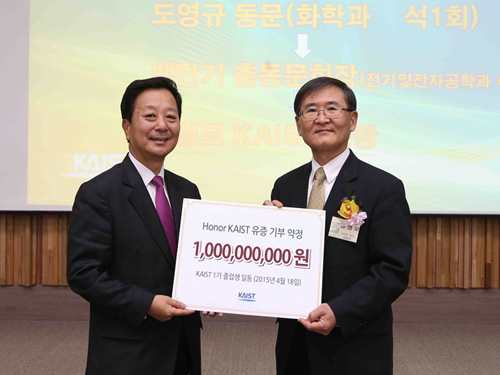 KAIST's Alumni Announces Its Vision to Raise Development Funds
The 40th anniversary of the Graduation and Homecoming Day took place at Seoul campus on April 18, 2015.
KAIST’s alumni announced its long-term vision called “Honor KAIST” to raise the development fund of USD 1 billion by 2100 at the 40th anniversary of “The First Master’s Graduation and Homecoming Day.” The anniversary ceremony took place at the Seoul campus on April 18, 2015. President Steve Kang, Man-Ki Paik, President of KAIST Alumni Association, and the first graduates of KAIST master’s program attended the event.
The first 106 master’s graduates of KAIST, the Class of 1975, received their degrees from eight departments. About 18 professors, including Dr. KunMo Chung, who taught the Class of 1975, and 52 graduates such as Suk-Joong Kang, Sik-Chol Kwon, Youngkyu Do, Sung Joo Park, Joon-Taik Park, Hyung-Kang Shin, Dong-Yol Yang, Seong Ihl Woo, Jae Kyu Lee, In-Won Lee, Byoung-Kyu Choi, and Kyu-Young Hwang participated in the homecoming event that proceeded with the tour of Seoul campus and the ceremony to deliver the first donation by the graduates.
The graduates involved in the vision campaign declared: “KAIST graduates have great pride in having taken part in advancing science and technology in Korea and are grateful for the education given by the nation. There is still a long way ahead for KAIST and Korea. The alumni should work together to help shaping the future of KAIST with great interest and affection for the institution.” They also urged KAIST graduates to donate more for their alma mater: “Let us try to participate in donating USD 100,000 in our lifetime!” The graduates added, “Having donations up to USD 1 billion helped MIT become a great university. We should take the lead in aiming to collect such amount by 2100 for KAIST.”
President Kang addressed the ceremony and said in his speech, “The Honor KAIST Development Funds will serve as the foundation for the university’s continuous, strong growth. Every member of KAIST will work in harmony to transfer KAIST into one of the top ten research universities in the world.” He continued, “The funds will be used to further future strategies of KAIST such as high impact Nobel-prize level research and innovative education.”
Contributors will receive benefits including an honorary lifetime email account entitled “Honor.KAIST” and will have their names listed on “The Honor KAIST” website and “The Honor KAIST” commemorative wall.
Picture 1: The First Master’s Graduation and Homecoming Day 2015
Picture 2: President Steve Kang (right) and President Man-Ki Paik of the KAIST Alumni Association
2015.04.22 View 9991
KAIST's Alumni Announces Its Vision to Raise Development Funds
The 40th anniversary of the Graduation and Homecoming Day took place at Seoul campus on April 18, 2015.
KAIST’s alumni announced its long-term vision called “Honor KAIST” to raise the development fund of USD 1 billion by 2100 at the 40th anniversary of “The First Master’s Graduation and Homecoming Day.” The anniversary ceremony took place at the Seoul campus on April 18, 2015. President Steve Kang, Man-Ki Paik, President of KAIST Alumni Association, and the first graduates of KAIST master’s program attended the event.
The first 106 master’s graduates of KAIST, the Class of 1975, received their degrees from eight departments. About 18 professors, including Dr. KunMo Chung, who taught the Class of 1975, and 52 graduates such as Suk-Joong Kang, Sik-Chol Kwon, Youngkyu Do, Sung Joo Park, Joon-Taik Park, Hyung-Kang Shin, Dong-Yol Yang, Seong Ihl Woo, Jae Kyu Lee, In-Won Lee, Byoung-Kyu Choi, and Kyu-Young Hwang participated in the homecoming event that proceeded with the tour of Seoul campus and the ceremony to deliver the first donation by the graduates.
The graduates involved in the vision campaign declared: “KAIST graduates have great pride in having taken part in advancing science and technology in Korea and are grateful for the education given by the nation. There is still a long way ahead for KAIST and Korea. The alumni should work together to help shaping the future of KAIST with great interest and affection for the institution.” They also urged KAIST graduates to donate more for their alma mater: “Let us try to participate in donating USD 100,000 in our lifetime!” The graduates added, “Having donations up to USD 1 billion helped MIT become a great university. We should take the lead in aiming to collect such amount by 2100 for KAIST.”
President Kang addressed the ceremony and said in his speech, “The Honor KAIST Development Funds will serve as the foundation for the university’s continuous, strong growth. Every member of KAIST will work in harmony to transfer KAIST into one of the top ten research universities in the world.” He continued, “The funds will be used to further future strategies of KAIST such as high impact Nobel-prize level research and innovative education.”
Contributors will receive benefits including an honorary lifetime email account entitled “Honor.KAIST” and will have their names listed on “The Honor KAIST” website and “The Honor KAIST” commemorative wall.
Picture 1: The First Master’s Graduation and Homecoming Day 2015
Picture 2: President Steve Kang (right) and President Man-Ki Paik of the KAIST Alumni Association
2015.04.22 View 9991 -
 KAIST and Hancom Sign for Development of Mobile Healthcare
KAIST signed a memorandum of understanding with Hancom, Inc., an office suite developer in Korea, to foster mobile healthcare software programs. President Steve Kang and Chairman Sang-Chul Kim of Hancom held a signing ceremony on March 13, 2015 at the KAIST campus.
Based on the agreement, KAIST and Hancom will exchange research personnel to build Dr. M, a smart healthcare platform developed by the university, collaborate in research and development, and cooperate in the transfer of research developments from the university to the software industry including Hancom.
KAIST and Hancom also signed a memorandum of understanding on the development of software in April 2014. The Hancom-KAIST Research Center opened on campus last October.
2015.03.20 View 10522
KAIST and Hancom Sign for Development of Mobile Healthcare
KAIST signed a memorandum of understanding with Hancom, Inc., an office suite developer in Korea, to foster mobile healthcare software programs. President Steve Kang and Chairman Sang-Chul Kim of Hancom held a signing ceremony on March 13, 2015 at the KAIST campus.
Based on the agreement, KAIST and Hancom will exchange research personnel to build Dr. M, a smart healthcare platform developed by the university, collaborate in research and development, and cooperate in the transfer of research developments from the university to the software industry including Hancom.
KAIST and Hancom also signed a memorandum of understanding on the development of software in April 2014. The Hancom-KAIST Research Center opened on campus last October.
2015.03.20 View 10522 -
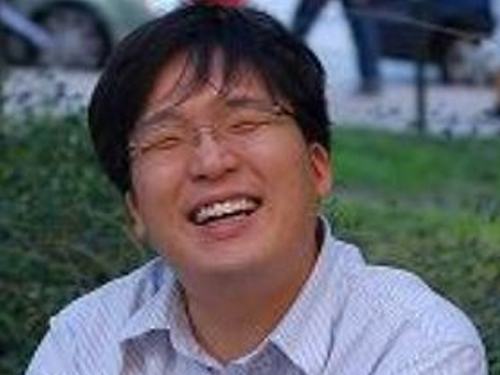 Dr. Dong-Hee Chung Honored with OYRA by Korean Physicists in America
Dr. Dong-Hee Chung, a KAIST alumnus (class of 2002) who is currently a professor of the Physics Department at the Pennsylvania State University (Penn State), received the 2015 Outstanding Young Researcher Award (OYRA) by the Association of Korean Physicists in America (AKPA).
The award ceremony was held on March 3, 2015 at AKPA’s annual conference. According to AKPA, Dr. Chung was recognized for his research achievements in the fields of the early universe, dark energy, and galaxy formation.
Dr. Chung finished both his undergraduate and graduate degrees at KAIST and received his doctorate in 2004 from the University of Texas at Austin. He was appointed a professor at Penn State in 2014.
2015.02.27 View 8175
Dr. Dong-Hee Chung Honored with OYRA by Korean Physicists in America
Dr. Dong-Hee Chung, a KAIST alumnus (class of 2002) who is currently a professor of the Physics Department at the Pennsylvania State University (Penn State), received the 2015 Outstanding Young Researcher Award (OYRA) by the Association of Korean Physicists in America (AKPA).
The award ceremony was held on March 3, 2015 at AKPA’s annual conference. According to AKPA, Dr. Chung was recognized for his research achievements in the fields of the early universe, dark energy, and galaxy formation.
Dr. Chung finished both his undergraduate and graduate degrees at KAIST and received his doctorate in 2004 from the University of Texas at Austin. He was appointed a professor at Penn State in 2014.
2015.02.27 View 8175 -
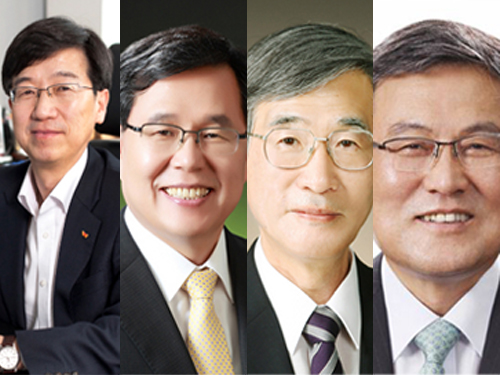 KAIST Announces the Recipients of Distinguished Alumni Awards
The KAIST Alumni Association (KAA) announced four “Proud KAIST Alumni” awards recipients for the year 2014: Sung-Wook Park, the Chief Executive Officer and President of SK Hynix; Seung Ho Shin, the President of Kangwon National University; Kew-Ho Lee, the President of the Korea Research Institute of Chemical Technology; and Mun-Kee Choi, the former Minister of Science, ICT and Future Planning of the Republic of Korea. The award ceremony took place during the 2015 KAA’s New Year's ceremony on January 17, 2015 at the Palace Hotel in Seoul.
Sung-Wook Park (M.S. ’82 and Ph.D. ’88, Department of Materials Science and Engineering), the Chief Executive Officer and President of SK Hynix, has worked as an expert in the field of memory semi-conductors for the past 30 years. He developed innovative technology and improved production efficiency, enabling the Korean semi-conductor industry to become a global leader.
Seung Ho Shin (M.S. ’79 and Ph.D. ’87, Department of Physics), the President of Kangwon National University (KNU), worked in the field of optical information processing, producing excellent research achievements and teaching the next generation of scientists. As the president of KNU, he has set an exemplary leadership in higher education.
Kew-Ho Lee (M.S. ’75, Department of Chemistry), the President of the Korea Research Institute of Chemical Technology, pioneered the field of separation film production which contributed greatly to Korean technological developments. He led several domestic and international societies to facilitate dynamic exchanges between industry and academia and with the international community.
Mun-Kee Choi (M.S. ’76, Department of Industrial and Systems Engineering), the former Minister of Science, ICT and Future Planning, the Republic of Korea, is a great contributor to the information and communications technology in Korea, working as a leader in the field of broadband integrated service digital network. He is also an educator for gifted students in science and technology, and a manager of the Electronics and Telecommunications Research Institute.
The Alumni Association established the “Proud KAIST Alumni Awards” in 1992 to recognize its alumni’s outstanding contributions to Korea and KAIST.
Pictured from left to right, Sung-Wook Park (the Chief Executive Officer and President of SK Hynix), Seung Ho Shin (the President of Kangwon National University), Kew-Ho Lee (the President of the Korea Research Institute of Chemical Technology), and Mun-Kee Choi (the former Minister of Science, ICT and Future Planning)
2015.01.19 View 16804
KAIST Announces the Recipients of Distinguished Alumni Awards
The KAIST Alumni Association (KAA) announced four “Proud KAIST Alumni” awards recipients for the year 2014: Sung-Wook Park, the Chief Executive Officer and President of SK Hynix; Seung Ho Shin, the President of Kangwon National University; Kew-Ho Lee, the President of the Korea Research Institute of Chemical Technology; and Mun-Kee Choi, the former Minister of Science, ICT and Future Planning of the Republic of Korea. The award ceremony took place during the 2015 KAA’s New Year's ceremony on January 17, 2015 at the Palace Hotel in Seoul.
Sung-Wook Park (M.S. ’82 and Ph.D. ’88, Department of Materials Science and Engineering), the Chief Executive Officer and President of SK Hynix, has worked as an expert in the field of memory semi-conductors for the past 30 years. He developed innovative technology and improved production efficiency, enabling the Korean semi-conductor industry to become a global leader.
Seung Ho Shin (M.S. ’79 and Ph.D. ’87, Department of Physics), the President of Kangwon National University (KNU), worked in the field of optical information processing, producing excellent research achievements and teaching the next generation of scientists. As the president of KNU, he has set an exemplary leadership in higher education.
Kew-Ho Lee (M.S. ’75, Department of Chemistry), the President of the Korea Research Institute of Chemical Technology, pioneered the field of separation film production which contributed greatly to Korean technological developments. He led several domestic and international societies to facilitate dynamic exchanges between industry and academia and with the international community.
Mun-Kee Choi (M.S. ’76, Department of Industrial and Systems Engineering), the former Minister of Science, ICT and Future Planning, the Republic of Korea, is a great contributor to the information and communications technology in Korea, working as a leader in the field of broadband integrated service digital network. He is also an educator for gifted students in science and technology, and a manager of the Electronics and Telecommunications Research Institute.
The Alumni Association established the “Proud KAIST Alumni Awards” in 1992 to recognize its alumni’s outstanding contributions to Korea and KAIST.
Pictured from left to right, Sung-Wook Park (the Chief Executive Officer and President of SK Hynix), Seung Ho Shin (the President of Kangwon National University), Kew-Ho Lee (the President of the Korea Research Institute of Chemical Technology), and Mun-Kee Choi (the former Minister of Science, ICT and Future Planning)
2015.01.19 View 16804 -
 Extracting Light from Graphite: Core Technology of Graphene Quantum Dots Display Developed
Professor Seokwoo Jeon of the Department of Materials Science and Engineering, Professor Yong-Hoon Cho of the Department of Physics, and Professor Seunghyup Yoo of the Department of Electrical Engineering announced that they were able to develop topnotch graphene quantum dots from graphite.
Using the method of synthesizing graphite intercalation compound from graphite with salt and water, the research team developed graphene quantum dots in an ecofriendly way.
The quantum dots have a diameter of 5 nanometers with their sizes equal and yield high quantum efficiency. Unlike conventional quantum dots, they are not comprised of toxic materials such as lead or cadmium. As the quantum dots can be developed from materials which can be easily found in the nature, researchers look forward to putting these into mass production at low cost.
The research team also discovered a luminescence mechanism of graphene quantum dots and confirmed the possibility of commercial use by developing quantum dot light-emitting diodes with brightness of 1,000 cd/m2, which is greater than that of cellphone displays.
Professor Seokwoo Jeon said, “Although quantum dot LEDs have a lower luminous efficiency than existing ones, their luminescent property can be further improved” and emphasized that “using quantum dot displays will allow us to develop not only paper-thin displays but also flexible ones.”
Sponsored by Graphene Research Center in KAIST Institute for NanoCentury, the research finding was published online in the April 20th issue of Advanced Optical Materials.
Picture 1: Graphene quantum dots and their synthesis
Picture 2: Luminescence mechanism of graphene quantum dots
Picture 3: Structure of graphene quantum dots LED and its emission
2014.09.06 View 19807
Extracting Light from Graphite: Core Technology of Graphene Quantum Dots Display Developed
Professor Seokwoo Jeon of the Department of Materials Science and Engineering, Professor Yong-Hoon Cho of the Department of Physics, and Professor Seunghyup Yoo of the Department of Electrical Engineering announced that they were able to develop topnotch graphene quantum dots from graphite.
Using the method of synthesizing graphite intercalation compound from graphite with salt and water, the research team developed graphene quantum dots in an ecofriendly way.
The quantum dots have a diameter of 5 nanometers with their sizes equal and yield high quantum efficiency. Unlike conventional quantum dots, they are not comprised of toxic materials such as lead or cadmium. As the quantum dots can be developed from materials which can be easily found in the nature, researchers look forward to putting these into mass production at low cost.
The research team also discovered a luminescence mechanism of graphene quantum dots and confirmed the possibility of commercial use by developing quantum dot light-emitting diodes with brightness of 1,000 cd/m2, which is greater than that of cellphone displays.
Professor Seokwoo Jeon said, “Although quantum dot LEDs have a lower luminous efficiency than existing ones, their luminescent property can be further improved” and emphasized that “using quantum dot displays will allow us to develop not only paper-thin displays but also flexible ones.”
Sponsored by Graphene Research Center in KAIST Institute for NanoCentury, the research finding was published online in the April 20th issue of Advanced Optical Materials.
Picture 1: Graphene quantum dots and their synthesis
Picture 2: Luminescence mechanism of graphene quantum dots
Picture 3: Structure of graphene quantum dots LED and its emission
2014.09.06 View 19807 -
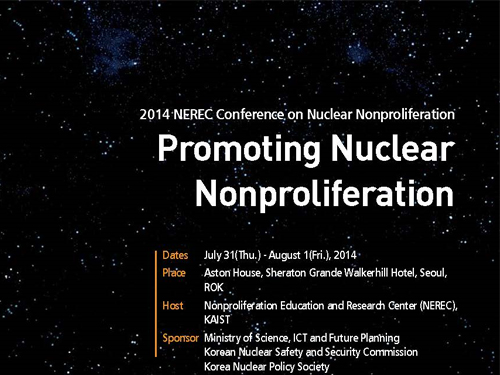 2014 NEREC Conference on Nuclear Nonproliferation: July 31-August 1, 2014, Seoul
The Nonproliferation Education and Research Center (NEREC) at KAIST hosted an international conference on nuclear nonproliferation on July 31-August 1, 2014 in Seoul. The Ministry of Science, ICT and Future Planning, the Korean Nuclear Safety and Security Commission, and the Korea Nuclear Policy Society (KNPS) sponsored the event.
Over one hundred experts and "thought leaders" in nuclear security and nonproliferation attended the conference and discussed issues related to the nonproliferation of nuclear weapons, the role of scientific community in mitigating nuclear threat and promoting the peaceful use of nuclear power, and nuclear disarmament policy.
Keynote speakers were: Steven E. Miller, Director of International Security Program at Belfer Center for Science and International Affairs, Harvard University; Scott D. Sagan, Senior Fellow of the Center for International Security and Cooperation, Freeman Spogli Institute for International Studies, Stanford University; Mark Fitzpatrick, Director of the Nonproliferation and Disarmament Programme, International Institute for Strategic Studies; Sang-Hyun Lee, Director of Security Strategy, Sejong Institute; and Man-Sung Yim, Professor of Nuclear and Quantum Engineering, KAIST.
At the conference, Professor Yim, Director of KAIST NEREC said, “Korea has grown to become a key player in the development of commercial nuclear energy over the past decades. We hope that our conference encourages Korea to be more involved in the efforts of the international community to enhance the global nonproliferation regime.”
2014.08.05 View 16019
2014 NEREC Conference on Nuclear Nonproliferation: July 31-August 1, 2014, Seoul
The Nonproliferation Education and Research Center (NEREC) at KAIST hosted an international conference on nuclear nonproliferation on July 31-August 1, 2014 in Seoul. The Ministry of Science, ICT and Future Planning, the Korean Nuclear Safety and Security Commission, and the Korea Nuclear Policy Society (KNPS) sponsored the event.
Over one hundred experts and "thought leaders" in nuclear security and nonproliferation attended the conference and discussed issues related to the nonproliferation of nuclear weapons, the role of scientific community in mitigating nuclear threat and promoting the peaceful use of nuclear power, and nuclear disarmament policy.
Keynote speakers were: Steven E. Miller, Director of International Security Program at Belfer Center for Science and International Affairs, Harvard University; Scott D. Sagan, Senior Fellow of the Center for International Security and Cooperation, Freeman Spogli Institute for International Studies, Stanford University; Mark Fitzpatrick, Director of the Nonproliferation and Disarmament Programme, International Institute for Strategic Studies; Sang-Hyun Lee, Director of Security Strategy, Sejong Institute; and Man-Sung Yim, Professor of Nuclear and Quantum Engineering, KAIST.
At the conference, Professor Yim, Director of KAIST NEREC said, “Korea has grown to become a key player in the development of commercial nuclear energy over the past decades. We hope that our conference encourages Korea to be more involved in the efforts of the international community to enhance the global nonproliferation regime.”
2014.08.05 View 16019 -
 A KAIST startup, YBrain, builds a wearable device to cure Alzheimer's
A group of KAIST graduates from the Departments of Bio and Brain Engineering, Computer Science, Materials Science Engineering, and Industrial Design created a startup called YBrain (http://ybrain.com/). YBrain develops a wearable neuroscience technology to treat or reduce the symptoms of degenerative brain diseases such as dementia and Alzheimer’s. Their recent technological developments were covered in e27, one of the leading blogs based in Singapore. The blog covers topics like the latest technology innovation, startups, and entrepreneurship in Asia. A news article follows below:
e27, June 24, 2014
“This wearable tech may be able to combat effects of Alzheimer’s”
http://e27.co/this-wearable-tech-may-be-able-combat-effects-of-alzheimers-20140624/
2014.06.25 View 13768
A KAIST startup, YBrain, builds a wearable device to cure Alzheimer's
A group of KAIST graduates from the Departments of Bio and Brain Engineering, Computer Science, Materials Science Engineering, and Industrial Design created a startup called YBrain (http://ybrain.com/). YBrain develops a wearable neuroscience technology to treat or reduce the symptoms of degenerative brain diseases such as dementia and Alzheimer’s. Their recent technological developments were covered in e27, one of the leading blogs based in Singapore. The blog covers topics like the latest technology innovation, startups, and entrepreneurship in Asia. A news article follows below:
e27, June 24, 2014
“This wearable tech may be able to combat effects of Alzheimer’s”
http://e27.co/this-wearable-tech-may-be-able-combat-effects-of-alzheimers-20140624/
2014.06.25 View 13768 -
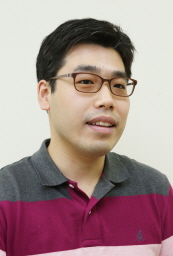 KAIST's graduate, the first Ph.D. holder in games, is appointed professor at Michigan State University in East Lansing
Dr. Tae-Woo Park
The academic community recognizes the study in games as a field for research
Dr. Tae-Woo Park, a graduate of KAIST, has been appointed a professor at Michigan State University (MSU) in East Lansing. He will start working in August at the Department of Telecommunications, Information Studies, and Media, the College of Communications Arts, MSU.
Dr. Park received a doctoral degree in games, the first of its kind in KAIST. His research focus is game design, research, and development.
Dr. Park has strived to enhance user experience by incorporating various aspects of everyday life into games and made efforts to introduce measures limiting or preventing game addiction, a major concern among young people in South Korea. Professor Joon-Hwa Song of Computer Science at KAIST, Dr. Park's advisor, commented that "KAIST graduates have been the main actors in the development of Korea's gaming industry. Our efforts to systemize the field of games into an academic discipline have been recognized through Dr. Park's appointment."
Dr. Park said that he plans "to apply mobile device and ubiquitous technology and develop games that will not only entertain users but also help them have a better life.”
2014.05.29 View 12541
KAIST's graduate, the first Ph.D. holder in games, is appointed professor at Michigan State University in East Lansing
Dr. Tae-Woo Park
The academic community recognizes the study in games as a field for research
Dr. Tae-Woo Park, a graduate of KAIST, has been appointed a professor at Michigan State University (MSU) in East Lansing. He will start working in August at the Department of Telecommunications, Information Studies, and Media, the College of Communications Arts, MSU.
Dr. Park received a doctoral degree in games, the first of its kind in KAIST. His research focus is game design, research, and development.
Dr. Park has strived to enhance user experience by incorporating various aspects of everyday life into games and made efforts to introduce measures limiting or preventing game addiction, a major concern among young people in South Korea. Professor Joon-Hwa Song of Computer Science at KAIST, Dr. Park's advisor, commented that "KAIST graduates have been the main actors in the development of Korea's gaming industry. Our efforts to systemize the field of games into an academic discipline have been recognized through Dr. Park's appointment."
Dr. Park said that he plans "to apply mobile device and ubiquitous technology and develop games that will not only entertain users but also help them have a better life.”
2014.05.29 View 12541 -
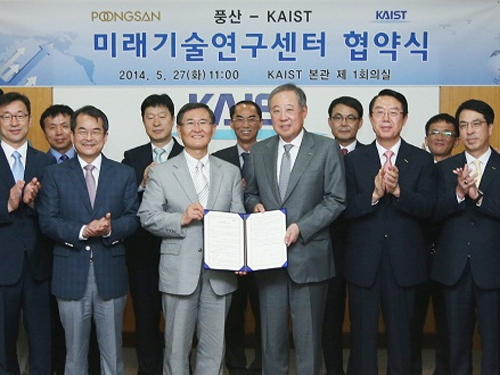 Establishment Agreement for KAIST-Poongsan Future Technology Research Center
KAIST and Poongsan Corporation agreed to found the KAIST-Poongsan Future Technology Research Center and held a ceremony to sign a memorandum of understanding in front of 30 attendees including KAIST President Steve Kang and Poongsan Chairman Jin Ryu on May 27 at KAIST.
The Research Center will develop basic technology in the fields of defense and high tech materials as well as build a new foundation for future Poongsan projects. Research areas include technologies for new materials, propulsion control, and defense.
To further this endeavor, Poongsan Corporation will support the KAIST-Poongsan Future Technology Research Center for 3 years through an investment of USD 2.95 million, personnel, and technology.
An agreement was made between KAIST and Poongsan to establish the Future Technology Research Center.
2014.05.29 View 8809
Establishment Agreement for KAIST-Poongsan Future Technology Research Center
KAIST and Poongsan Corporation agreed to found the KAIST-Poongsan Future Technology Research Center and held a ceremony to sign a memorandum of understanding in front of 30 attendees including KAIST President Steve Kang and Poongsan Chairman Jin Ryu on May 27 at KAIST.
The Research Center will develop basic technology in the fields of defense and high tech materials as well as build a new foundation for future Poongsan projects. Research areas include technologies for new materials, propulsion control, and defense.
To further this endeavor, Poongsan Corporation will support the KAIST-Poongsan Future Technology Research Center for 3 years through an investment of USD 2.95 million, personnel, and technology.
An agreement was made between KAIST and Poongsan to establish the Future Technology Research Center.
2014.05.29 View 8809 -
 Dr. Sung-Gu Kim of KARI receives the 10th KAIST Jung-Hun Cho Academic Award
KAIST President Steve Kang awarded the 10th "KAIST Jung-Hun Cho Academic Award" to Dr. Sung-Gu Kim of Korea Aerospace Research Institute (KARI) along with Byeong-Sup Park, a graduate student of KAIST Aerospace Engineering, Hee-Won Chae of Korea University, and Jin-Hyung Noh of Kongju National University High School on May 13, 2014.
Dr. Sung-Gu Kim was recognized for his development of a 30-ton class reproduction cooling burner and the securing of essential factor technology for liquid-fuel rocket engines on the Naro project.
The KAIST Jung-Hun Cho Academic Award was established to commemorate Jung-Hun Cho who was killed while researching in the rocket laboratory on May 13, 2003. From 2005, young scientists from the Aerospace Engineering field have been recognized every year. One student each from KAIST, Korea University, and Kongju National University High School, where the honorary doctorate Dr. Cho attended, has been chosen as a scholarship recipient.
The KAIST Jung-Hun Cho Academic Award was established with USD 460,000 in funds donated from Cho's family.
2014.05.17 View 10969
Dr. Sung-Gu Kim of KARI receives the 10th KAIST Jung-Hun Cho Academic Award
KAIST President Steve Kang awarded the 10th "KAIST Jung-Hun Cho Academic Award" to Dr. Sung-Gu Kim of Korea Aerospace Research Institute (KARI) along with Byeong-Sup Park, a graduate student of KAIST Aerospace Engineering, Hee-Won Chae of Korea University, and Jin-Hyung Noh of Kongju National University High School on May 13, 2014.
Dr. Sung-Gu Kim was recognized for his development of a 30-ton class reproduction cooling burner and the securing of essential factor technology for liquid-fuel rocket engines on the Naro project.
The KAIST Jung-Hun Cho Academic Award was established to commemorate Jung-Hun Cho who was killed while researching in the rocket laboratory on May 13, 2003. From 2005, young scientists from the Aerospace Engineering field have been recognized every year. One student each from KAIST, Korea University, and Kongju National University High School, where the honorary doctorate Dr. Cho attended, has been chosen as a scholarship recipient.
The KAIST Jung-Hun Cho Academic Award was established with USD 460,000 in funds donated from Cho's family.
2014.05.17 View 10969